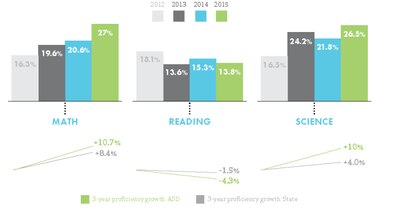After a bumpy first two years, a flagship effort to turn around some of Tennessee’s lowest-performing schools is showing the test score gains it was created to accomplish.
Math and science scores rose faster this year at schools in the Achievement School District than they did on average across the state, while their reading scores kept pace with the state. Schools that have been under the ASD’s control for the longest saw the largest gains.
You can see school-level and district scores here, and our list of things to consider while doing your own test score analysis here.
The improvements came after two years in which stagnant or even falling test scores raised questions about whether the ASD could achieve its goal of catapulting schools from the bottom 5 percent statewide to the top quarter.
The district’s strategy is to overhaul the low-performing schools, usually by assigning them to charter operators, without changing their student bodies.
Since the ASD launched three years ago, it has been touted by policymakers in Tennessee and across the country as a promising approach for states looking to improve their lowest-performing schools — and criticized by some local educators and communities for not showing results quickly enough.
ASD officials and state officials said Wednesday that the new scores suggest that the district’s approach takes time to bear fruit.
“We needed time to see the progress, and now we have, and it’s like a shot in the arm,” outgoing Superintendent Chris Barbic said at a rally in Frayser to celebrate the test score gains .
“When you look at the schools that have been part of the ASD the longest…we’re seeing the growth that was anticipated,” state Education Commissioner Candice McQueen added.
Indeed, gains were most dramatic in the first schools absorbed by the ASD three years ago. Schools under their first year of ASD control saw slower gains, or even slid backwards, just as the schools posting large gains this year did two years ago.

Barbic said there are good reasons for schools not to show dramatic test score gains in the first year of a turnaround effort.
“What we’re learning is step one is establishing a strong and positive culture,” he said. “Once you establish culture, then you can leverage that, and turn it into academic results for kids.”
Still, it’s not clear if the schools are improving fast enough to be among the top-performing in Tennessee in two years. More than half of elementary and middle schools across the state have math proficiency levels above 50 percent this year, while in the ASD, only Whitney Achievement Elementary School had a proficiency level that high.
And next year the state will get a new test, TNReady, which McQueen has said likely will cause scores to fall across the state.
Barbic said he is optimistic that at least some of the schools are on track to achieve the district’s lofty ambitions.
“None of us are able to predict the future but … our belief is that as long as we can sustain that growth, then we will certainly have schools in the top quartile in five years time,” he said.
This year was an especially important year for Westside Achievement School, one of the ASD’s direct-run schools. If schools in the ASD don’t make gains for two consecutive years, the management and teachers are booted. Out of 26 ASD schools last year, only six were in their third year. Of those, only Westside was in danger of another overhaul. Double-digit gains in math and science have averted that possibility.
Tim Ware, the director of the district’s direct-run schools, said at the rally that he couldn’t pinpoint the reason for the improvements.
“It’s … a hundred specific things working in concert with each other,” he said. “A close partnerships with the community, an in-depth understanding of where students are academically, and an understanding of how to move them where they need to be.”

